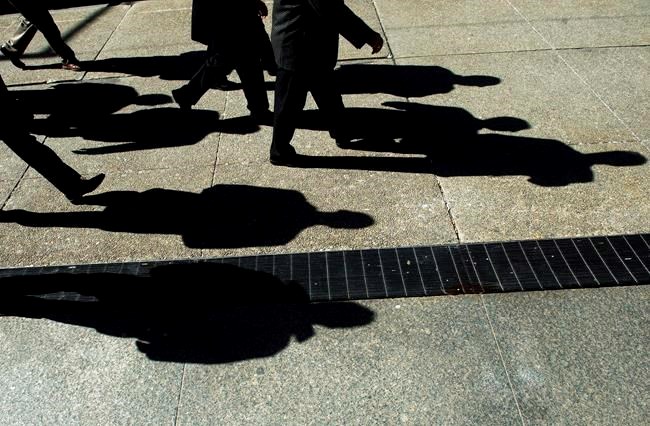TORONTO — Credit counsellor Pamela George is hearing from Canadians who feel lost amid the financial strife of COVID-19.
After the Ottawa-based adviser began offering free phone consultations last month, the stories began to flow in. Some told her they hadn't established emergency funds for the unexpected, and now they're worried simple necessities could sap their regular savings accounts.
"I'm seeing so much anxiety," George explained by phone. "A lot of people don't have hope things will get better."
But George says there are many reasons she's confident people will see themselves through the unsettling weeks and months ahead, even if they don't have a proper emergency fund in place.
Some assistance will come through the federal government, which is rolling out the Canada Emergency Response Benefit. The $2,000-a-month taxable benefit will be available to any worker who earned $5,000 in the previous year and whose income drops to zero due to COVID-19. That includes contract and self-employed workers.
But financial advisers suggest many Canadians would benefit from asking tough questions about their own spending habits, and laying down strict new rules to live by, that will help mitigate the impact on their financial savings.
Here are some general financial tips for managing through COVID-19:
STRIP TO THE ESSENTIALS
Do you really need Spotify, Netflix or that cable package stacked with sports channels? Can you reduce your consumption of alcohol or cannabis? George says these are key questions to seriously consider as you eliminate unnecessary expenses from your credit card bills. Done right, she estimates it could save up to 25 per cent of your income. And the financial benefit could extend beyond the coming months. "I see a recession lasting two of three years, so we have to prepare ourselves," she says. "Little things, like saving $20 here and there is going to count down the road."
LINES OF CREDIT
If you've lost your job or are struggling to pay the rent, tapping into a line of credit is a great option — if you have it. The upside of a line of credit is that it's typically cheaper than racking up high interest on your credit card or through other loans. The downside is that if you haven't already been approved by your bank or credit union while your finances are secure, chances are you won't qualify if you've lost your steady income.
David Dyck, head of client services at roboadviser WealthBar, says people who've worn through their emergency savings may consider a line of credit, or digging into their long-term savings as a last resort. "They're likely going to incur big losses on the long-term investment portfolio if they have to take some of that money," he says. "The interest they'll pay on a credit line is likely going to be less than the losses they'd be accepting to cash out of a long-term portfolio."
BE AWARE OF SCAMS
Desperate times can bring out the good in people, but it also attracts scammers looking to profit from other people's misfortune. It's one reason why Dyck urges vigilance during the COVID-19 crisis, which has led to a spike in phoney texts purporting to be cash deposits from the government. In other cases, people will make public pleas for money, a claim that isn't always legitimate. "Be very wary of scams and fraudsters because they are trying to do everything they can right now to rip people off," he says. "Any time you talk about financial transactions on a social media platform, you're increasing the risk of things like identity theft and fraud."
DON'T COUNT ON MORTGAGE DEFERRALS
While the country's biggest banks pledged to offer mortgage payment deferrals for up to six months as part of COVID-19 relief, it shouldn't be the first option you take. Financial advisers say deferring payments is costly because the interest you would've paid is packed onto the existing mortgage, meaning you pay interest on top of the interest.
George says she's found that people who need virus-related mortgage payment deferrals the most aren't necessarily the ones getting support from Canada's banking system — no matter what the financial institutions pledge in their promotional materials. "Clients are still jumping through hoops and they have to pay a lot of interest to have their mortgage deferred," she says.
FILE YOUR TAXES NOW
Ottawa has extended the 2019 income tax return filing deadline until June 1, which means any idle hands during self-isolation could be put to good use getting those documents sent to the Canada Revenue Agency. "If you're somebody who hasn't filed your taxes and you expect to get a refund, filing as quick as possible might get some short-term money in your pocket in the next few weeks," suggested Daniel Tersigni, portfolio manager at Wealthsimple. And even if you wind up owing money, that payment deadline has also been extended to Aug. 31.
REPLENISH THE FUND
Emergency funds are meant for the unexpected, but remember that after COVID-19 the pot of savings will still need to be restored to its former glory. Tersigni recommends rebuilding that reserve so it represents three to six months of your expenses. "One of the things that, as we eventually come out on the other side of this, will be reinforced is the importance of having an emergency fund," he said. "If you never had one in the first place, make that a high priority in your financial life."
This report by The Canadian Press was first published March 31, 2020.
David Friend, The Canadian Press



